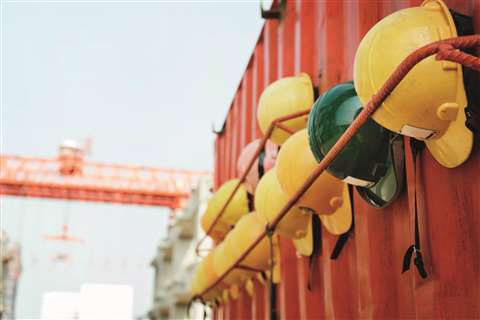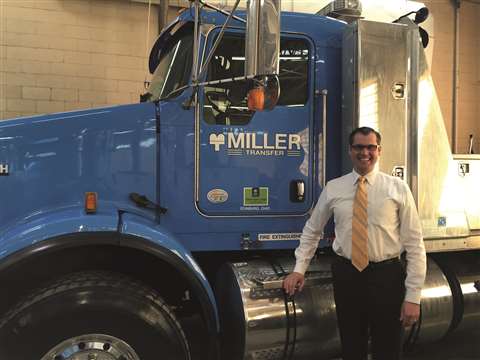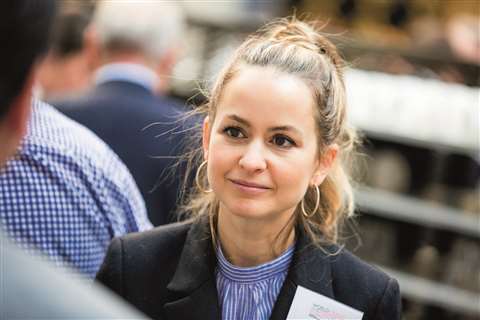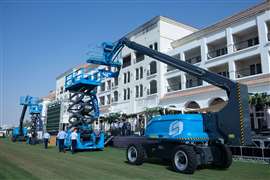Safe future: SC&RA news December 2018
17 December 2018

Winning an SC&RA safety award impacts a company across multiple facets of the business. It ranges from promotion, worker retention and insurance coverage to company morale and even the ability to secure future work.
A proven safety culture, strengthened by industry recognition in the form of awards, speaks volumes about a company’s level of commitment to its culture, its people, its mission and its customer base. Undoubtedly an established reputation for safety can grow a company’s bottom line.
For SC&RA members looking to apply, Crane & Rigging Project Safety and Crane Rental Service Awards are given each month. All other SC&RA awards are recognised and presented at the Association’s Annual Conference each April. Yearly awards are presented in four categories: Crane & Rigging, Transportation, Industry and Longevity.
Mitch Unger, Miller Transfer president, knows about the residual value that safety can bring to a company’s financial future. Miller received an SC&RA Transportation Award and the Driver of the Year award for Mike Nichols in 2016. Safety begins, Unger believes, with core values and a commitment to culture.

“We try to be as transparent as possible with our workforce, and we want them to be all in with us in the same way that we want to be all in with them,” Unger maintained. “At the end of the day, it doesn’t matter what industry you’re in. We have a proven process and we share that with prospective customers. As we’re sharing our experiences and attempting to form this relationship, safety certainly becomes a part of it.”
Unger explained that safety awards, for example, the ones Miller has received from SC&RA, along with other recognition, including positive CSA scores, helps to build the story of a business, which generates trust with potential customers and even other companies who are looking to partner with a company, which ultimately makes good business sense.
“There’s absolutely a cost factor to success – to building that culture,” Unger pointed out, “but there’s also a payoff. And the safety component is vital to building that trust component which, especially in specialized transport and rigging, can mean the difference between securing and sustaining work, and losing it – or never getting it in the first place.”
Direct impact
The notion of an increasingly expanding and competitive industry isn’t lost on Jennifer Gabel, of JK Crane, who understands the value of being recognised by her Association and acknowledged by peers. “The Safety Awards programme is a great way to foster safety initiatives because the industry-wide recognition is an added incentive,” she explained. “We post our awards to our social media sites and keep them prominently on display so that our customers can see them when they’re in our office.”

Like Unger, Gabel has learned the value of putting together an effective story for her business. “In recent years, we’ve had experiences that indicate it’s becoming more effective to utilise safety records when interacting with insurance companies, potential workers and hopeful clients – building a narrative,” she added. “Any award is a bit of a PR moment for us – whether locally or industry wide via SC&RA. It allows us to be seen, especially on the local level, which proves effective for potential business and hopefully attractive to quality workers who now have many options to choose from – and certainly aren’t going to look in the direction of a poor safety record and reputation.”
Chris Vlk, president at Dobson Industrial, Inc., echoes Gabel’s thoughts about attracting insurance companies within a competitive space. “Having zero recordable injuries in any given year is a major achievement in our industry,” he stressed. “Having back-to-back years is even more impressive – which has a direct impact on our workers compensation insurance premiums, where we’ve been able to negotiate deep discounts, saving us huge amounts of money.”
Beneath Vlk’s suggested money-saved-is-money-made umbrella, Gabel indicates, additionally, that a poor safety record or reputation can easily take money out of your pocket before it was even there. “If you have a certain number of recordable incidents that cause your EMR [experience modification rate] to go up, we know that certain companies simply won’t do business with you.”
Gabel added that money spent cutting corners can also come back to haunt you. “I can’t think of too many scenarios that can devastate your business financially more than a lawsuit. Any money you thought you might be saving, especially on safety, could easily be wiped out. And you just never know what type of accident you might have; there are plenty of factors out of your control in this business which makes the factors you can control – safety above everything else – all the more vital to protecting your workers, the project and your company. And hopefully this focus allows you to grow financially as a result.”
Mutual success
Such growth is literally fuelled by safety culture, according to Jeff Hammons, president at JHam Group Consulting, LLC. “A lot of companies you might want to work with will demand this type of high-level execution of safety culture – you’ve got to pre-qualify with them first,” he affirmed. “You’ve got to go through a pretty extensive process in order to even qualify to bid for their business. And then, once you’re there, if you win the work, you’ll be validated by how you execute those services and represent that culture.”
More and more companies that Hammons works with are subscribing to this belief, he said, “Which is why I work with them. The most successful, profitable way to do business is to execute in the area of safe performance, with proper culture development initiatives in place to sustain it. A culture like this gives everyone in the organisation a voice and that only strengthens the business and solidifies the initiatives that are in place so, as the culture grows alongside the company, it only gets stronger in time.”
From an insurance standpoint, Hammons said companies are wise to produce upstream initiatives that produce downstream results, noting that insurance companies look to establish financial partnerships with safety-conscious companies where everybody wins and grows together.
To that end, Joe Doerr, programme manager at NBIS (NationBuilders Insurance Services, Inc.), agrees that SC&RA member companies can certainly save on insurance by maximising an impressive safety record. “An underwriter has the ability to give modification credit or debit,” he said. “A company with a stellar safety profile with plenty of industry recognition, including a handful of association awards, is very likely going to get a percentage credit – i.e. savings.”
Doerr, like Unger and Gabel, also can’t ignore the opportunity companies have to grow business by adding quality workers. Again, this is born out of a commitment to safety. “In today’s market, from operators to drivers, the scenario is pretty much reversed,” he said. “Now, everyone is hiring, so potential workers are examining who they want to work with much more seriously. Your ability to attract workers who will take your company to the next level will definitely be impacted by safety, on every level.”
For information on applications and entry guidelines and all entry forms, see: www.scranet.org/awards







